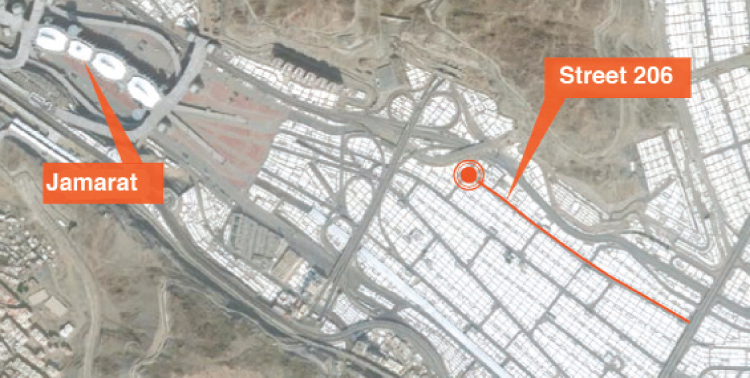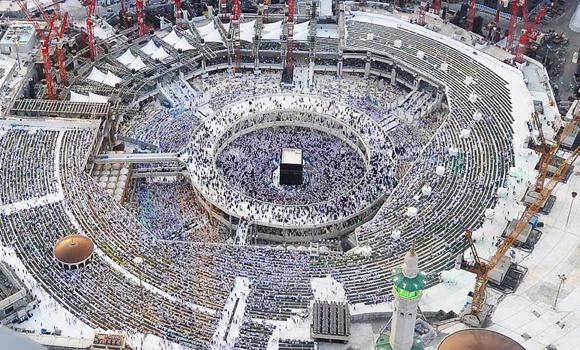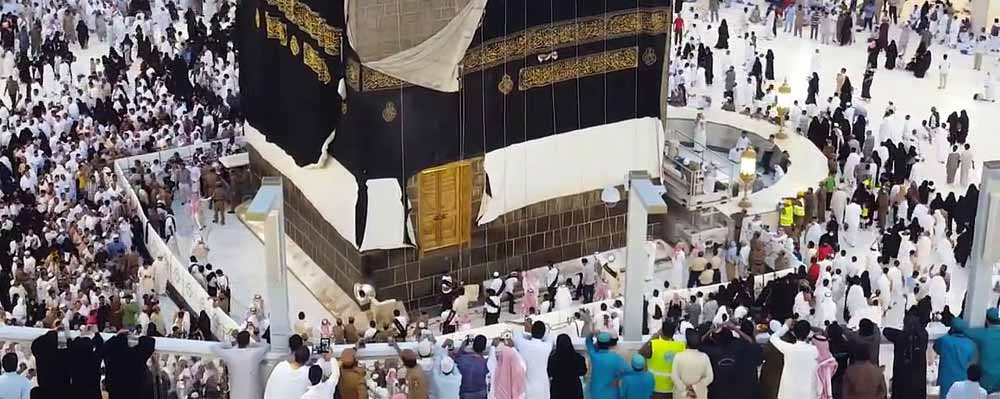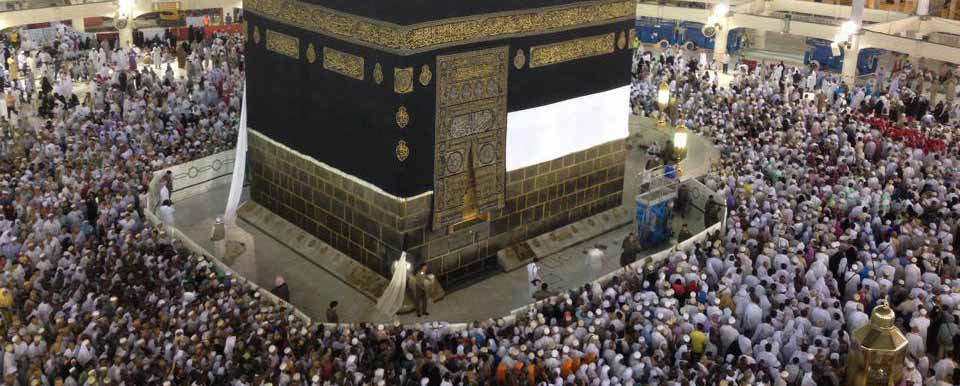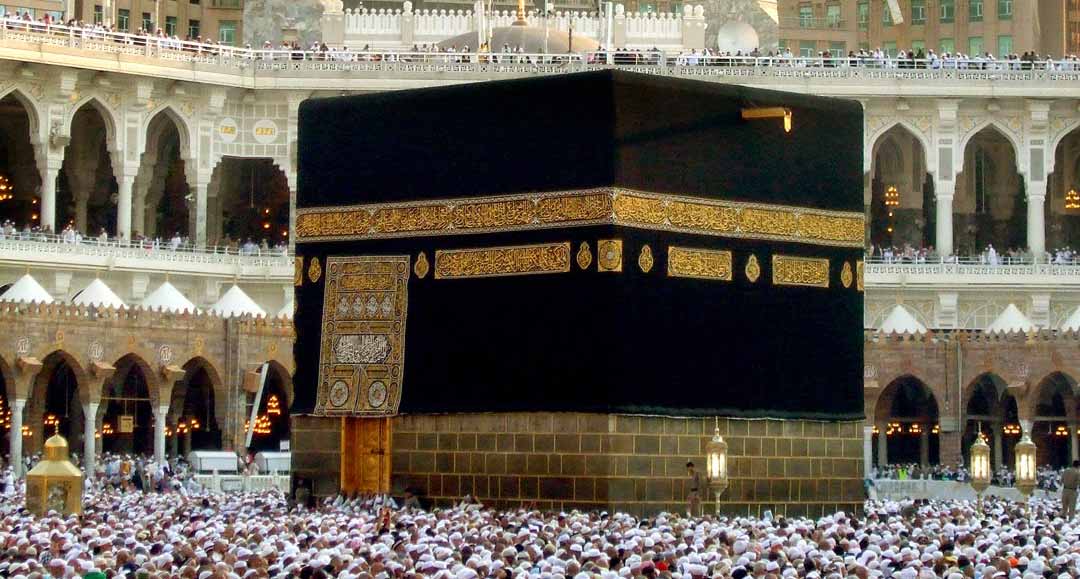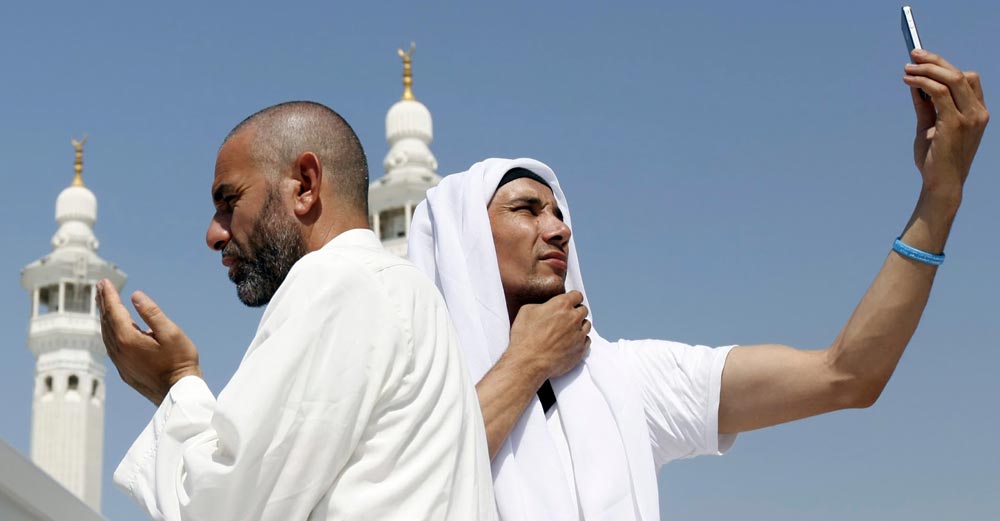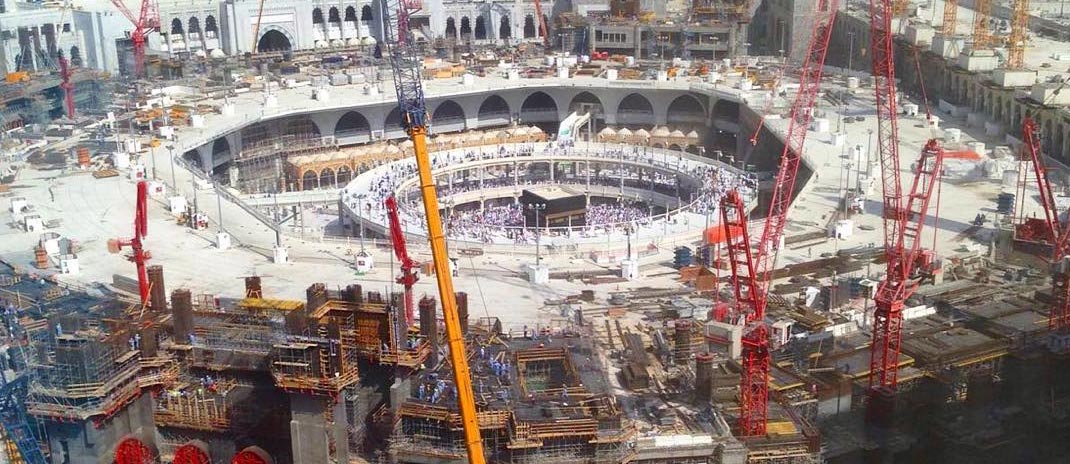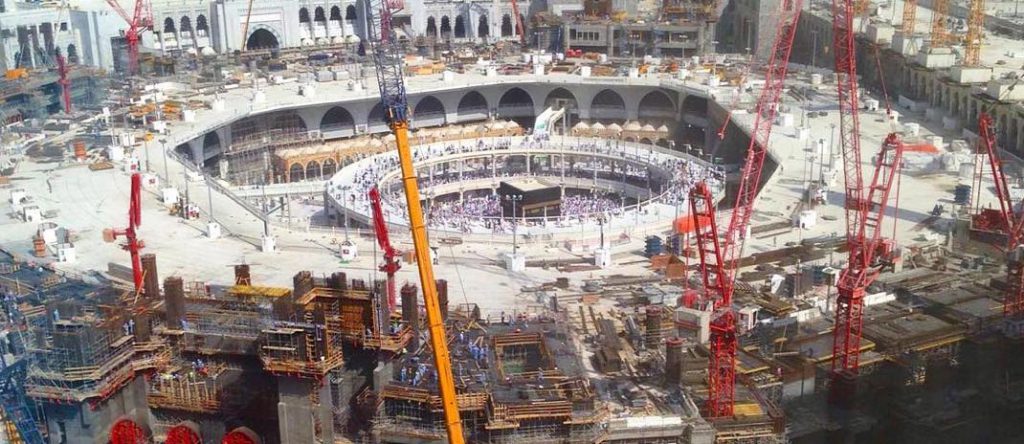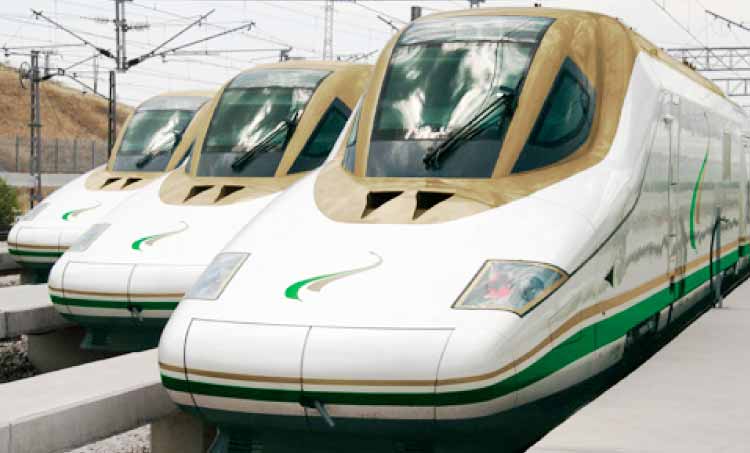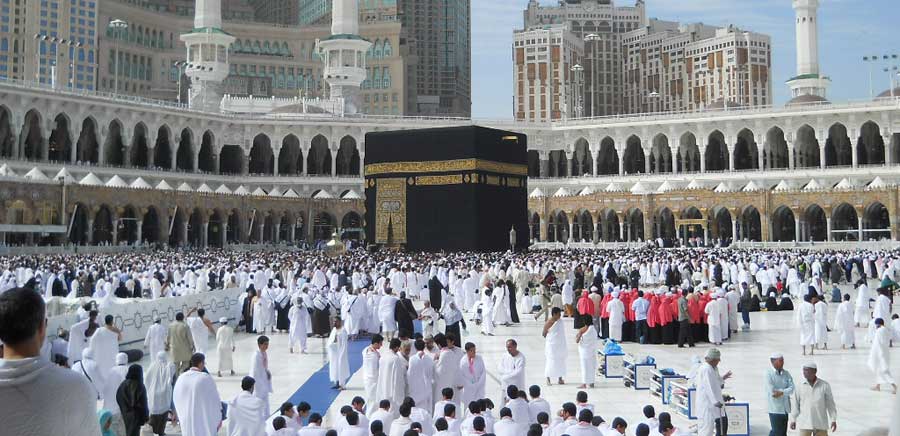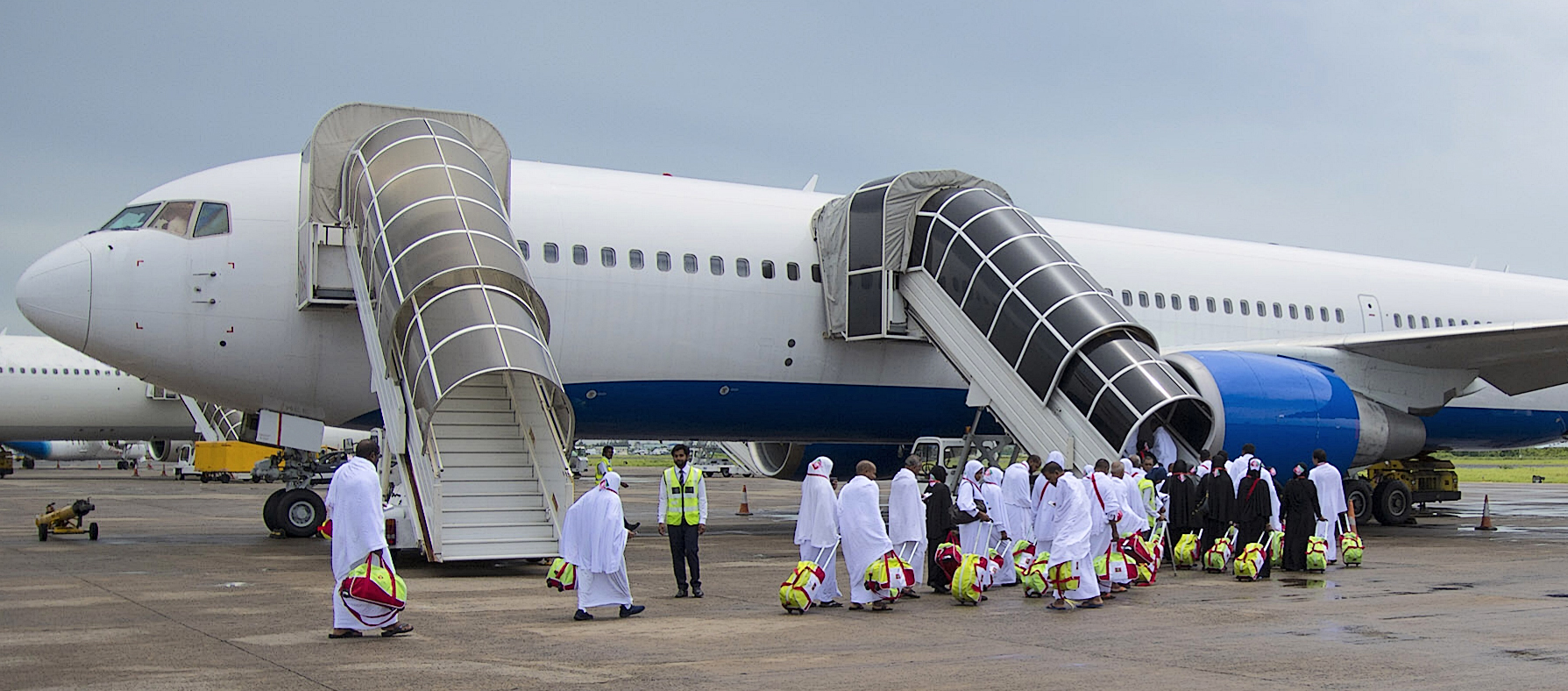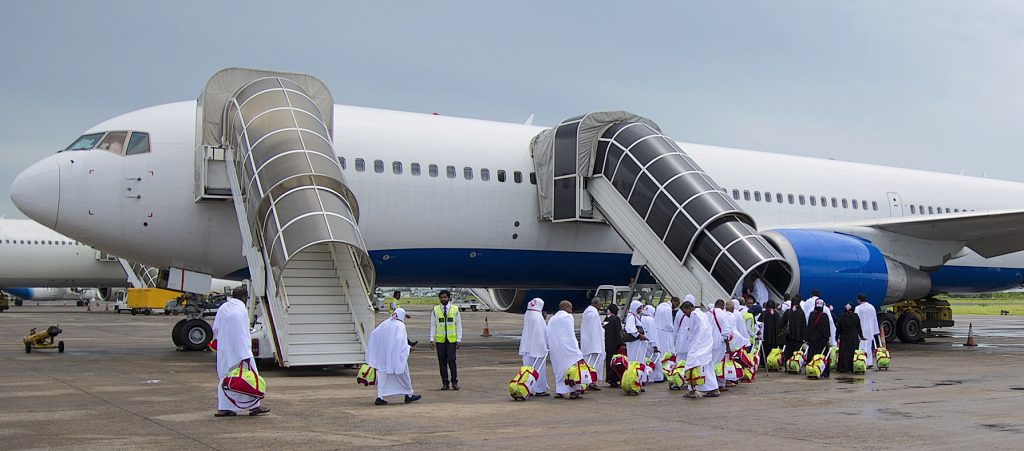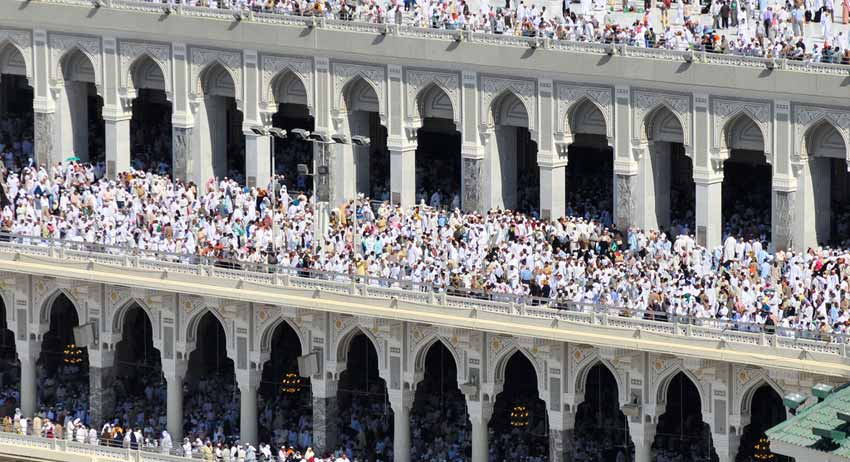
By Him whose House the loving Haj visit,
Responding with ihram at the appointed limit,
Uncovering their heads in total humility
Before One to Whom faces bow in servility.
They exclaim in the valleys,
“We have responded to You –
All Praise is Yours, and Kingdom too!”
He invited and they answered, with love and pleasure;
When they called upon Him, nearer came the Divine treasure.
You see them on their mounts, hair dusty and disheveled,
Yet never more content, never happier have they felt;
Leaving homelands and families due to holy yearning,
Unmoved are they by temptations of returning.
Through plains and valleys, from near and far,
Walking and riding, in submission to Allâh.
[At the Ka’bah]
When they see His House – that magnificent sight
For which the hearts of all creatures are set alight –
It seems they’ve never felt tired before,
For their discomfort and hardship is no more.
Now the eye of the Lover drowns in its streams,
It sees through its tears the goal of its dreams;
Now for Allâh, how many tears are issued?
Each one being followed by a multitude,
When the eye perceives the House, its darkness clears,
And from the sorrowful heart, pain disappears;
Vision cannot encompass this beautiful sight:
Each glance returns with greater delight!
No wonder at this, for when the Merciful preferred
The House for Himself, it became most honoured.
He clothed it in Majesty, a magnificent garment;
Embroidered it with Beauty, a wonderful ornament!
The hearts all love the House therefore,
Awed and humbled, in respect and honour.
Arafat
Now to ‘Arafat, hoping for Mercy and Forgiveness
From the One overflowing with Generosity and Kindness;
Now for Allâh is that Magnificent Standing
Like, though lesser than, the Day of Reckoning.
The Irresistible draws near, His Majesty manifest,
Boasting to His angels, for He is the Mightiest,
“My slaves have come to Me so lovingly,
I’ll be Generous and Merciful, willingly.
I have forgiven their sins, – to this you are witness –
Fulfilled their hopes, and showered them with goodness.”
So joyous news! O people of that standing,
When sins are forgiven and Mercy is spreading;
How many slaves are set completely free?
Whilst others seek a cure, and heal will He.
Now Satan is never known to lose such face:
He’s blameworthy, rejected, in utter disgrace.
For he sees a matter that enrage him must:
He flees, slaps his face and covers it in dust!
Such Forgiveness he never did see
As granted by the Lord, and such Mercy!
He built his edifice from every temptation available
Till he thought it was complete, unassailable;
Then Allâh struck his building at its very foundation,
So it fell upon him, tumbling in devastation;
What worth has his structure, this evil ploy,
That he does build, and the Lord does destroy?
[Muzdalifah and Mina]
Now to Muzdalifah, to spend the night
In the Sacred Area, then Prayer at first light;
Now on to the Great Pillar, which they need
To stone at the time of the Prayer of ‘Id;
Now to their tents for the sacrifice prepared,
Reviving the tradition of a Father revered.
If sacrificing themselves were Allâh’s demand,
They would respond, submitting to the command;
Just as they’d expose their necks in Jihad
To Allâh’s enemies, till these stream with blood;
They discipline themselves, presenting the head for a shave:
Bringing humility and happiness to the obedient slave.
[The Tawaf of Ifadah/Ziyarah]
So when they’ve removed those natural growths,
Completed their rites, and fulfilled their oaths,
He invites them again to visit His House:
What honour and welcome this visit allows!
By Allâh, they visit it in so much splendor,
Receiving their rewards and plenty of honour;
There Allâh bestows Grace, Favour and Kindness,
Showing Generosity, Mercy and Forgiveness.
[Mina]
Then they return to Mina, each to his tent,
Every minute wish is granted, and they are content;
They stay there a day, then another, then a third,
They’re allowed to depart early, but to stay is preferred;
They stone the pillars daily after the sun’s decline,
With a slogan of Takbir in the presence of the Divine!
If only you could see their standing there:
Palms outstretched, hoping for Mercy’s share!
“O Lord! O Lord! Knowing as You do
That we hope for no-one, only You!
Then grant our wish, O You All-Knowing,
We pray for Your Mercy overflowing.”
[The Farewell Tawaf]
When they’ve achieved at Mina all their gains,
Once more they fill the valleys and plains:
To the Ka’bah, the Sacred House, by the end of the day,
To circle it seven times, and then to Pray.
When departure nears and they are certain
That the bond of proximity is about to loosen,
There’s only a last stand for a final farewell:
Now for Allâh are the eyes that swell,
And for Allâh are the heavy hearts that turn
Into cauldrons of desire where fire does burn;
And the passionate sighs whose heat so vigorous
Nearly melts the Lover, ecstatic, rapturous!
Now you see those bewildered, perplexed in the throng,
Whilst others chant their sorrowful song:
“I depart, but there remains for You my yearning,
My fire of grief is raging and burning;
I bid farewell, but longing pulls my reins –
My heart is encamped in Your eternal plains!”
No blame today for saying what you feel:
No blame for expressing what you used to conceal!
Article by: en.islamway.net
